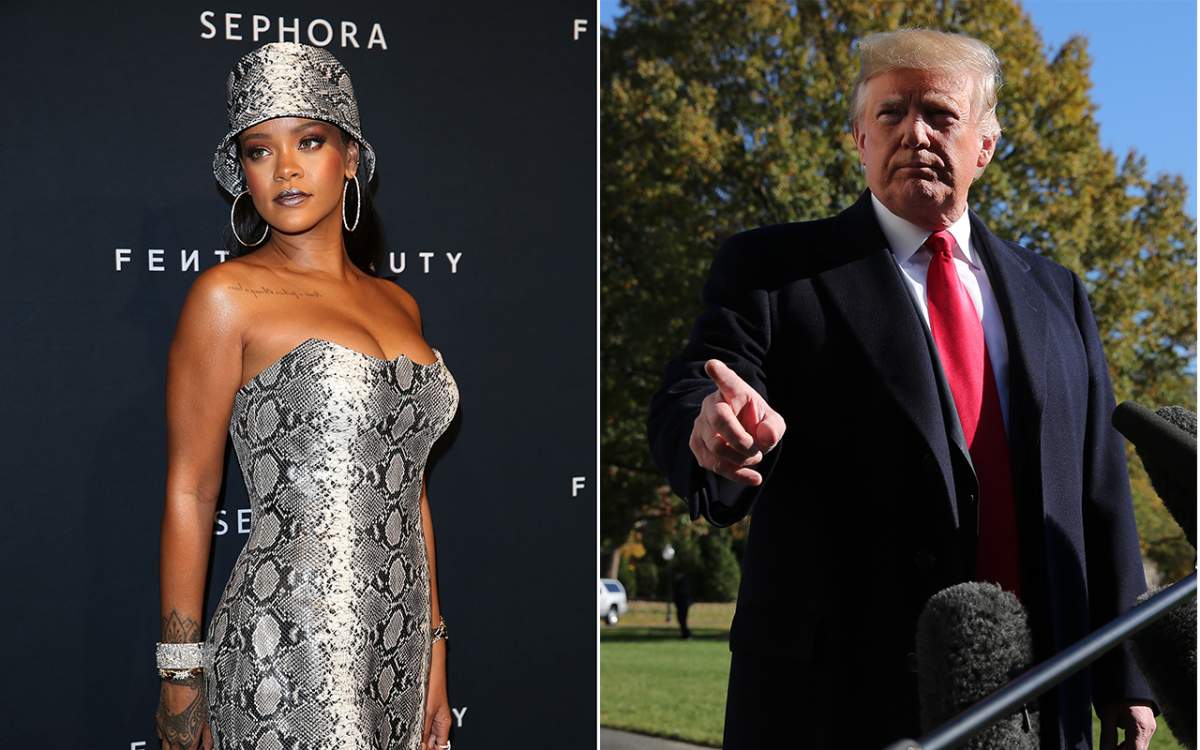Rihanna has joined the list of artists who are unhappy over U.S. President Donald Trump using their music at his rallies.

The Barbadian singer, who cannot vote in the United States, responded Sunday after Philip Rucker, the White House bureau chief for the Washington Post, tweeted that her song, Don’t Stop the Music, was being played at a Trump rally in Chattanooga, Tenn.
“It’s been said a million times, but here’s a million and one — Trump’s rallies are unlike anything else in politics. Currently, Rihanna’s Don’t Stop the Music is blaring in Chattanooga as aides toss free Trump T-shirts into the crowd, like a ball game. Everyone’s loving it,” Rucker tweeted.
READ MORE: Pharrell Williams threatens to sue Trump for using ‘Happy’ at rally on day of Pittsburgh shooting
“Not for much longer … me nor my people would ever be at or around one of those tragic rallies, so thanks for the heads up philip!” Rihanna tweeted in response.
READ MORE: Snapchat apologizes for Rihanna and Chris Brown ad making light of domestic abuse
Rihanna’s dismissal of Trump support comes after she endorsed Tallahassee Mayor Andrew Gillum for governor of Florida on Sunday.

Get breaking National news
“You have the opportunity to make history this election,” she wrote. “The US has only had four black Governors in its entire history, and we can help make #AndrewGillum the next one and Florida’s first!”
READ MORE: Steven Tyler sends Donald Trump cease-and-desist letter for playing Aerosmith at rallies
Axl Rose of Guns N’ Roses also expressed frustration with his music being used at political rallies.
“Just so ya know… GNR like a lot of artists opposed to the unauthorized use of their music at political events has formally requested r music not b used at Trump rallies or Trump associated events,” Rose wrote.
“Unfortunately the Trump campaign is using loopholes in the various venues’ blanket performance licenses which were not intended for such craven political purposes, without the songwriters’ consent. Can u say “sh*tbags?!”💩,” he wrote.
He continued: “Personally I kinda liked the irony of Trump supporters listening to a bunch of anti Trump music at his rallies but I don’t imagine a lot of ’em really get that or care.”
READ MORE: Pete Davidson faces backlash for mocking veteran’s eye patch in ‘SNL’ skit
Last week, Pharrell Wiliams had his lawyer send a cease-and-desist letter to Trump to stop playing Happy at his political events.
Trump played the song at a rally in Indiana, just hours after the mass shooting at the Tree of Life synagogue in Pittsburgh where 11 people died.
“On the day of the mass murder of 11 human beings at the hands of a deranged ‘nationalist,’ you played his song Happy to a crowd at a political event in Indiana,” lawyer Howard E. King wrote. “There was nothing ‘happy’ about the tragedy inflicted upon our country on Saturday and no permission was granted for your use of this song for this purpose.”
According to William’s lawyer, the artist “has not” and “will not” grant Trump permission to “otherwise broadcast or disseminate any of his music.”
William’s legal team also noted that the use of the song was not only poorly timed, but it was in violation of “copyright infringement” and “trademark rights.”
“Demand is hereby made that you cease and desist from any further unauthorized use of Pharrell Williams’ music,” the letter stated.
WATCH BELOW: Steven Tyler sends Donald Trump cease-and-desist letter for playing Aerosmith at rallies

Other artists, including Steven Tyler, The Rolling Stones, Adele, Prince’s estate and Queen have requested Trump not use their music.
The Washington Post points out that when a politician wants to use a song as background music at a rally, their campaign needs a public performance licence from the copyright holder of the musical composition, rather than one from the recording artist.
- ‘Even Stevens’ star Christy Carlson Romano reveals positive cancer screening
- Hugh Hefner’s sons deny allegations of ‘underage girls’ photos in foundation materials
- Stephen Colbert hits back at CBS bosses in dispute over unaired interview
- James Van Der Beek renewed wedding vows with wife in bed days before death








Comments
Want to discuss? Please read our Commenting Policy first.